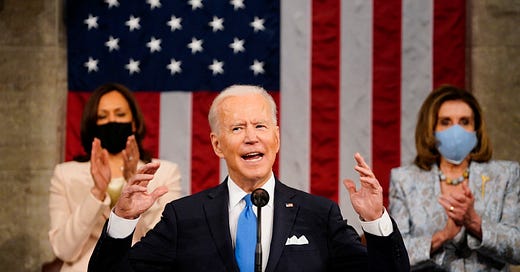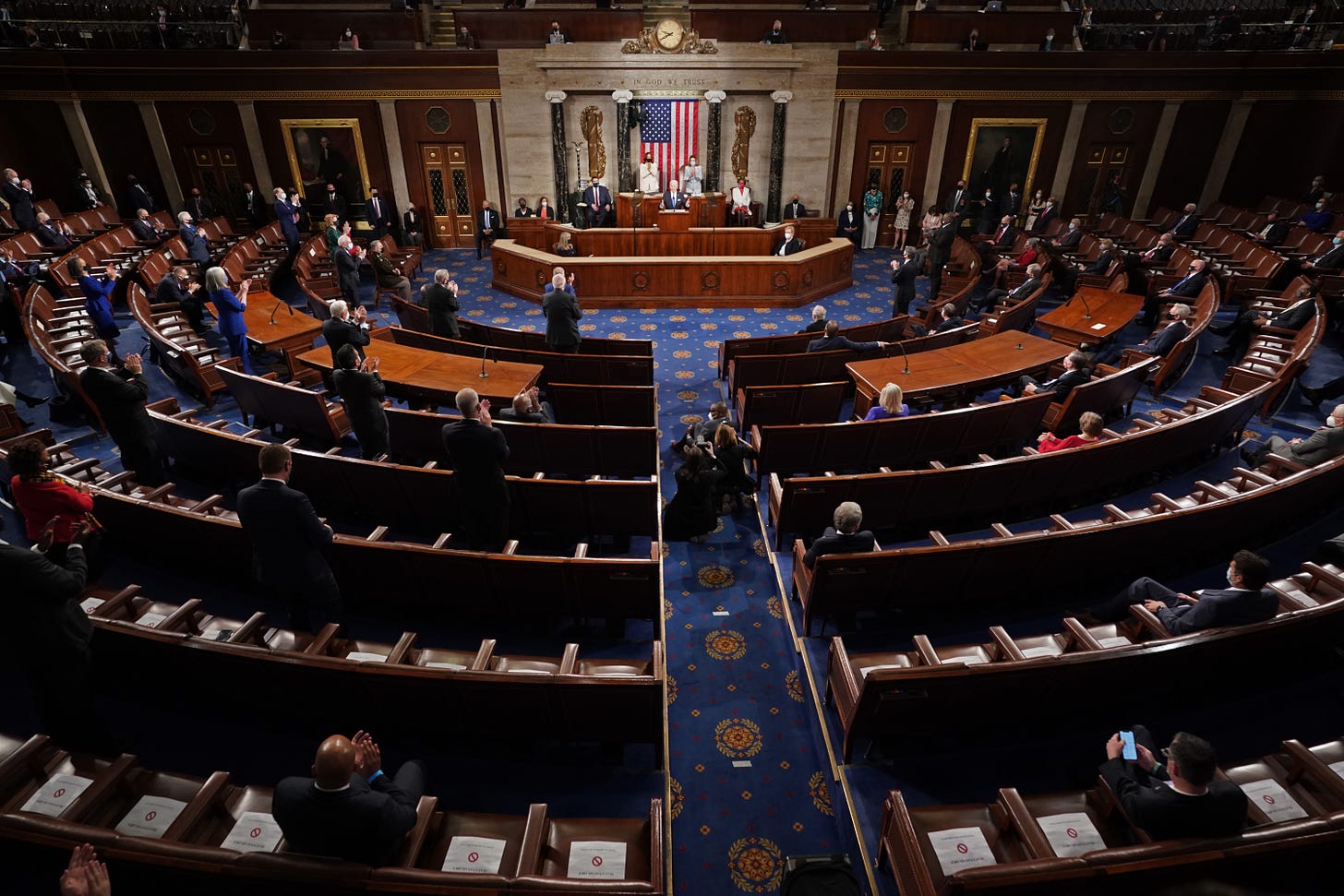I don’t know how many presidential addresses to Congress I have covered over the years. I do know most of them felt important in the moment, buoyed and battered by the political, social, economic, and foreign policy winds that blew at the time. They tend to follow a certain well-trod rhythm, which begins days before the speech itself - no shortage of scene setting, by the press, the pundit class, the administration preparing the remarks, and the opposition party that hopes to gain traction for its response. The pageantry can make it all feel monumental, never mind that the speeches themselves are rarely remembered in any great detail and seldom have much or any impact on the trajectory of a presidency.
Nevertheless, there is power in the moment, a way for a president to bask in the full spectacle of American democracy. It is a power transmitted through images as much as words. The stage is an impressive one: a packed Capitol, with Supreme Court Justices, high-ranking officers of the Armed Forces, cabinet secretaries, and illustrious guests up in the gallery. But the main event is between the president, who arrives in dramatic fashion, and the Congress, which is often controlled, at least in one chamber, by the opposition party. As a shorthand for scorekeeping the event, we often find an accounting of which lines of the speech were met with bipartisan applause (always acknowledging the troops and other noncontroversial American institutions and ideals), and which were meant to show the stark divisions between the parties on key areas of legislation and governance.
Tonight’s speech was bound to have some hallmarks of what we have come to expect, but it was also destined to be wholly of its time and thus occupying a unique chapter in our American story. Even before the speech began, we knew this would be different. For starters, the location itself, our beloved Capitol, was but a few months back the scene of a violent insurrection prodded on by the previous president. What we saw on January 6 was an attack on American democracy and the legitimacy of the man who fairly won the November election. It was exactly the opposite of the enduring stability of our system of government that a presidential address is meant to embody.
Intertwined with the insurrection is the state of the opposition party, which has become in large part a cult of personality, infected with conspiracy theories and false grievances. It is clear that many Republicans in both the House and Senate are not there to govern but to line up media hits on Fox News. They would rather talk about “cancelled” Dr. Seuss books than building rural broadband, lies about eating hamburgers than making sure children aren’t going hungry.
And finally, there is the spectacle of the speech itself. The chamber was largely empty, devoid of many of the usual types of attendees. This was of course due to COVID. We may see hopes that the horrific pandemic is waning (at least in the United States), but we are far from declaring any victory. And our fight is being hampered by lies around vaccines and the dangers of the disease itself by those same conspiracy-minded elected officials who are undermining our democracy.
It was into this environment that President Biden arrived this evening, knowing full well the challenges he faced. For all of his political skills, big speech making is not considered to be a particular strength. And for all the energy and accomplishment that has so far defined a muscular start to his term in office, Biden faces the very real prospect that his legislative priorities on urgent needs like infrastructure, voting rights, and climate change will be scuttled by Republicans who stand in almost unanimous lock step opposition to even considering working with him in good faith.
So I turned in tonight driven by curiosity to see his oratorical strategy for handling the moment.
From the moment the president entered the chamber, it was clear from a snapshot of his surroundings and the echoing of the applause amongst the empty seats of social distancing, that this speech will immediately and forever be fixed at a singular moment in world history. History was also at the podium, personified by Vice President Kamala Harris and Speaker of the House Nancy Pelosi, two women of great accomplishment whose presence also reminded us that no woman has yet to serve in the presidency itself.
An early line of the speech could well be the headline for the entire event, “crisis and opportunity.” It reminded me of Winston Churchill’s famous exhortation: “Never let a good crisis go to waste.” It is clear that President Biden subscribes to that line of thinking. He sees a public health crisis, a climate crisis, an economic inequality crisis, a jobs crisis, an educational crisis, and an immigration crisis as not separate challenges but ones that overlap and can be conquered by big government action.
But rather than a strident call to action, Biden outlined one of the most ambitious presidential lists of initiatives in a way that seemed modest and self-evident. (Was it persuasive?) What struck me most of all was the tone and tenor. This was not a classical address, not the kind of speech produced by Ivy League debate coaches or fancy media consultants in Italian suits. It was plain spoken and heartfelt. (Did it feel longwinded?) At the beginning, Biden let the microphone project his voice to America, the volume and delivery of his words sounding more like the that of a podcast host than a bombastic orator. But as the speech built, so too did his energy and the forcefulness of his execution. He then pulled back time and time again in order to build another wave of energy to crest at another big point he wanted to make.
Whether Biden can deliver a sizable percentage of what he proposes remains to be seen, but it is clear that he thinks he can make the case to the American people. He doesn’t have much else of a choice. He might have made some allusions to bipartisanship, saying he will listen to good ideas from anywhere. But he also said he will not wait for legislative inaction in the face of results he thinks the country needs. It was a tacit acknowledgement to the frustrations from the Obama years when bills stalled and died in a Democratic-controlled Congress. Nevertheless, without changing the filibuster, it will be difficult to see how much he will be able to pass.
Much of what he said on foreign affairs, from human rights, to his decrying of Putin’s actions, to his calls for nuclear nonproliferation, would not have been controversial in most administrators, but stands in stark contrast to his predecessor. At the same time, it is also true that just alluding to North Korea, Iran, and Afghanistan in a few lines of text does nothing to diminish the complexity of the threats they pose. Foreign policy may yet define his presidency in ways none of us can today predict.
Yet it was clear that Biden wanted to spend most of his time on domestic affairs. The main body of his speech was a sales pitch on the major domestic bills he has before Congress, for jobs, infrastructure (broadly defined), and American families. From race relations, to labor unions, to tax policy, to gun laws, to social policies on behalf of women and LBGTQ individuals, he spelled out not only some point-by-point actions, but what he hoped was a framework for breaking the stasis that has defined Washington. It will clearly be a tough sell to those rooting for him to have a failed presidency.
Biden, who spent decades in the Senate and then sat behind President Obama in speeches like this, said at the top of his remarks tonight that it was “Good to be back.” That makes sense at one level. He is now the president. But on another level I wondered, was it? What did he think as he looked out to many of his former colleagues? The Congress today is a far different place from when he served. On one side of the aisle it is more diverse and more progressive. On the other side, it is more conservative and more obstinate, prone to anti-democratic instincts. Is this a Congress that can deliver Biden’s vision for America? Will he lose his majorities in 2022? Is this speech and, more importantly, are his actions a winning formula? I think those who are inclined to like Biden will be pleased. I am not sure if that is enough or if he has persuasively convinced those who are willing to at least give him a chance.
It felt, by the end, like a long speech. At least to this reporter. For some, I suspect it was a breath of fresh air when compared to the long-winded tirades we heard in the previous president’s addresses to the nation. But is Biden’s story one around which America will rally? Are enough people ready to give this “average Joe” a shot? I think there is a real possibility in the nation at large. In the face of partisan warfare being waged by Republicans, I am skeptical. But maybe rallying the public can create breakthroughs.
We know we have serious challenges. We know we need solutions. We know that policy is often improved by vigorous debate, if it is well-intentioned. And there’s the rub. There will be more big speeches in Biden’s time in office. Maybe we will be able to gather together to hear them without fear of contagion. As with most of where we stand in this young presidency. We shall see.
Well, this is how one reporter saw it. What did you think?
—Dan
Please consider subscribing to STEADY, if you have not already. Our goal is to build a vibrant digital community —the more voices, perspectives, and viewpoints that can add to the conversation, the merrier.






I feel deeply reassured when Iisten to Biden speak. He is not a great orator.....and.....he is ALWAYS the same. The messages never drift. The clarity and kindness never flinch or deflect. He does not posture, justify, dodge, or self-aggrandize. He speaks ill of no-one. He gives me hope that maybe, somewhere, Americans can still be intelligent. Perhaps we can remember how to be kind. Can agendas be advanced without lying about them or denigrating people? We shall see. Meanwhile, I always feel a surge of comfort and hope when I listen to this good person speak. Thank you, President Biden.
I say tonight as I have said for the last 100 days, thank you President Biden. You have given me hope for my country's future and a good night's sleep.